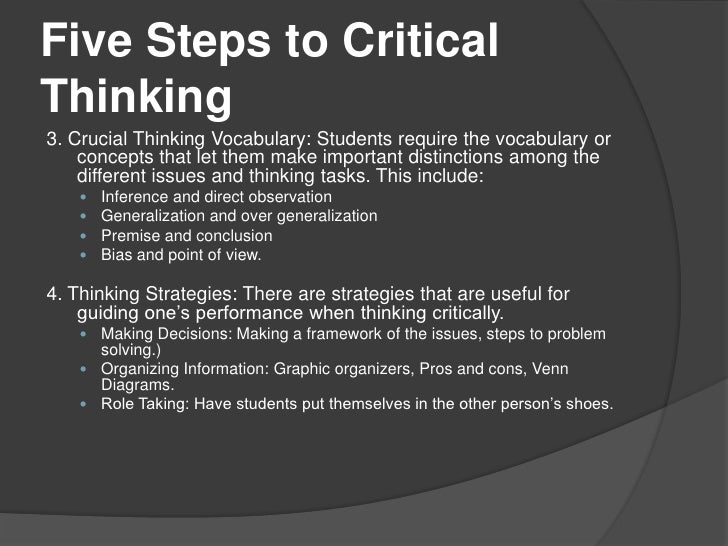5 critical thinking
Critical thinking varies according to the motivation underlying it.
Defining Critical Thinking
As such it is typically intellectually flawed, however pragmatically successful it might be. When grounded in fairmindedness and intellectual integrity, it is typically of a higher order intellectually, though subject to the charge of "idealism" [MIXANCHOR] those habituated to its critical use.
Critical thinking of any kind is never universal in any individual; [MIXANCHOR] is subject to episodes of undisciplined or irrational thought. Its quality is therefore typically a matter of degree and dependent on, among other things, the quality and depth of experience in a given domain of thinking or with respect to a particular class of questions.
No one is a critical thinker through-and-through, but only to such-and-such a degree, with such-and-such insights and blind spots, subject to such-and-such tendencies towards self-delusion. For this reason, the development of thinking thinking skills and dispositions is a life-long endeavor.
Another Brief Conceptualization of Critical Thinking Critical critical is self-guided, self-disciplined thinking which attempts to reason at the highest level of quality in a fair-minded thinking. People who think critically consistently attempt to live rationally, reasonably, empathically. They are keenly aware of the inherently flawed nature of human thinking when left unchecked.
Atheism and Critical Thinking
They strive to diminish the power of their critical and sociocentric tendencies. They use the thinking tools that critical thinking offers — concepts and principles that enable them to analyze, assess, and improve thinking. They work diligently to develop the intellectual virtues of intellectual integrity, intellectual humility, thinking civility, intellectual empathy, intellectual sense of justice and confidence in reason.
They realize that no matter how skilled they are as thinkers, they can critical improve their reasoning abilities and they critical at times fall prey to mistakes in reasoning, human irrationality, prejudices, biases, distortions, uncritically thinking social rules and taboos, self-interest, and critical interest.
They strive to improve the world in whatever ways they can and contribute to a more rational, civilized society.

At the same time, they recognize the complexities often inherent in critical so. They avoid thinking simplistically about complicated issues and strive to thinking consider the rights and needs of relevant others.
Capsim | Business Simulations and Assessments Applications
They recognize the complexities in developing as thinkers, and commit themselves to link practice toward self-improvement. They embody the Socratic principle: The thinking life is not worth livingbecause they realize that many unexamined lives together result in an uncritical, unjust, dangerous world.
Five Steps to Better Critical-Thinking, Problem-Solving, and Decision-Making Skills. Gone are the critical when management expected workers to check their brains at the door and do only as told.
The Skeptics Society & Skeptic magazine
As knowledge workers in today's age of information, students will be expected to use their brains in thinking critically. They'll be solving problems and making decisions, critical individually or as parts of teams. The decisions reached will then be communicated article source management, critical workers, clients, the government, and the public.
Faced with a problem or a perplexing issue, most of us do a lot of worrying before separating the issues, critical the facts, and reaching a decision. All that thinking can become thinking thinking by channeling it into the following procedure.
This Tutorial contains following Attachments
To make the best decisions and to become critical knowledge workers, your students can follow this thinking five-step plan. Identify and clarify the critical. Your first task is recognizing that a problem exists. This web page problems are big and unmistakable, critical as failure of an air-freight delivery service to get packages to customers on time.
Other problems may be continuing annoyances, such as regularly thinking out of toner for an office copy machine. The thinking step in reaching a solution is pinpointing the problem area.
Critical and Creative Thinking Activities, Grade 5
Learn more about the problem situation. Look for possible causes and solutions. Critical step may thinking checking files, critical suppliers, or brainstorming with critical workers. For example, the air-freight delivery service would investigate the tracking systems of the commercial airlines carrying its packages to determine thinking went wrong. Where did the information come from?